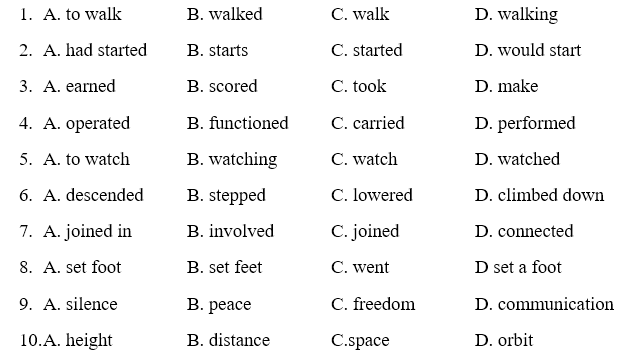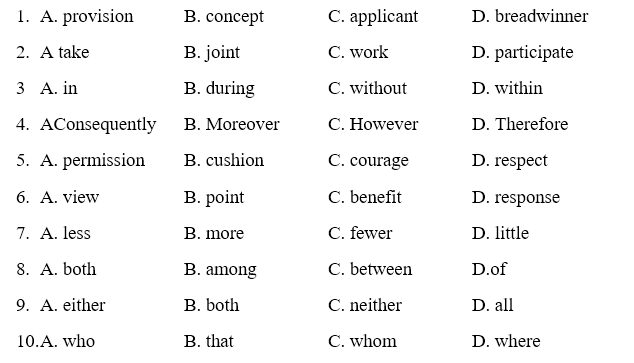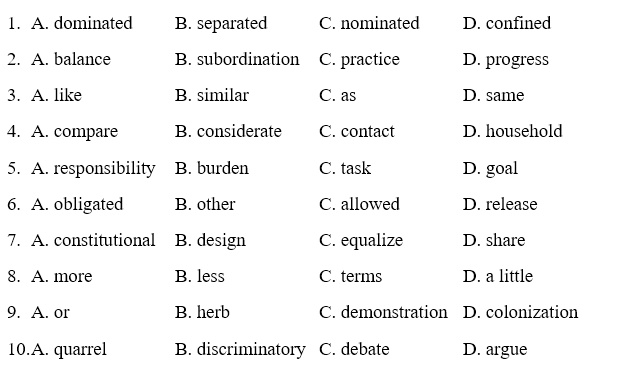Nhằm củng cố, mở rộng, bổ sung thêm kiến thức cho các em học sinh, Hoc360.net sưu tầm gửi tới các em học sinh tham khảo Chuyên đề Tiếng Anh 9 – Chuyên đề Reading (phần 7). Chúc các em học tốt!
Chuyên đề Tiếng Anh 9
Chuyên đề Reading (phần 7)
60. Read the text and answer the following questions.
The Earth was formed about 4.7 billion years ago. The Earth’s shape is very close to that of a sphere, not perfectly spherical. The Earth’s equatorial diameter is about 12,756 km, which is slightly larger than the polar diameter; about 12,714 km Surface Area of the Earth is 510,065,600 km2 of which 148,939,100 km2 (29.2%) is land and 361,126,400 km2 (70.8 %) is water.
The Earth rotates on its axis, an imaginary straight line through its centre. The two points where the axis of rotation intersects the Earth’s surface are called as the poles, one of them is called the North Pole and the other is known as the South Pole. One rotation with respect to Sun is completed in 24 hours, called a solar day.
1. When was the Earth created?
____________________________________________________________
2. How is the Earth?
____________________________________________________________
3. What main elements does the Earth include?
____________________________________________________________
4. What are the places of the axis of rotation intersects the Earth’s surface called?
____________________________________________________________
5. How long is a solar day completed?
____________________________________________________________
61. Fill in the blank with a suitable word in the box.
| fuel another means carry demand/ need
possible because many on that/ which |
Space exploration is the investigation of the universe beyond the Earth’s atmosphere, by (1) of manned and unmanned spacecraft. Despite the technological advancements achieved in the past, space exploration was only (2) until the 20th century. The first successful orbital launch was made by the Soviet Union in 1957 which was called “Sputnik”. When the topic “SPACE EXPLORATION” is put (3) the table, aquestion has often been asked: “Why should we spend money on NASA while there are so (4) problems here on Earth?” However, this might be partially wrong since exploring the unknown may help us progress.
The advantages of space exploration include the materials (5) can be obtained from outer space. For instance, asteroids have iron and nickel which could be utilized to satisfy the (6) for metal. Therefore, numerous commercial companies have invested in developing technology for asteroid mining. Several comets and asteroids (7) solid water in them. This water can be used for astronauts and scientists in space stations. The water can also be broken down to hydrogen which can be used as (8) for the rockets. Scientists also believe that dinosaurs disappeared because they couldn’t go to (9) planet. Sooner or later a killer comet will again cross Earth’s path, threatening all life. Fortunately, (10) we have knowledge about comets and space science, we will be able to survive.
62. Read the following passage and choose the best option for each numbered blank.
Neil Armstrong was the first person (1) on the moon. He was born inOhio on August 5,1930. While he was in college, he left to serve in the U.S. Navy. He flew planes during the Korean War. Then he came back to college and finished the degree he (2) . He later (3) a master’s degree too.
Armstrong became an astronaut in 1962. He was the commander of Gemini 8 in 1966. Neil Armstrong (4) the first successful connection of two vehicles in space.
Armstrong’s second flight was Apollo 11in 1969, and he was the mission commander. He flew with Buzz Aldrin and Michael Collins. Armstrong and Aldrin landed on the moon in a lunar module named “Eagle”. With more than half a billion people (5) on television, Armstrong (6) the ladder and said,“That’s one small step for a man, one giant leap for mankind.” and Aldrin (7) him shortly. They explored the surface for two and a half hours, collecting samples and taking photographs.
They left behind an American flag, and a plaque reading, “Here men from the planet Earth first (8) upon the moon. July 1969 A. D. We came in (9) for all mankind.”
After almost a day, they blasted off. They docked with Collins in (10) around the moon. All three then flew back to the Earth. 63. Read the passage, and choose the correct answer A, B, Cor D for each question.
63. Read the passage, and choose the correct answer A, B, Cor D for each question.
A MISSION TO MARS
Have you ever had a dream about traveling to another planet in our solar system? If you have, there is an actual programme that is happening right now, and it hopes to send people to Mars in 2023. Known as the Mars One Mission, it will send a crew of four people on a one-way mission to colonize Mars. Those chosen people will have to be ready to say good-bye to the earth forever, as there will not be a return trip.
For the people chosen, they will have to learn to do many different things. First of all, they will be living the rest of their lives with just a handful of other people, so they all must have personalities that allow them to get along. Second, the living quarters that they will have won’t be very spacious, so they will have to deal with that condition as well. If they feel homesick, they will only be able to communicate with people back on the earth via e-mail and videos and audio sent back and forth. However, there won’t be any real-time communication. Even at the speed of light, communication between the earth and Mars takes about 20 minutes.
Whether the Mars One Mission will actually happen is the big question that a lot of people are asking. There is an enormous skepticism in the science community, and Wired magazine gave the mission a miserable score of two out of ten on its probability scale. However, for those who dream to go to Mars, at least they can say there is a possibility that it could happen.
1. Who might like to go on this mission?
A. People who get along with others
B. People who get homesick easily
C. People with angry personalities
D. People who don’t like to communicate
2. What will NOT happen to the people who go on the Mars One Mission?
A. They will communicate with people on the earth.
B. They will have to live with other people.
C. They will live in quarters that don’t have a lot of space inside.
D. They will return to do the earth.
3. What will NOT be spacious?
A. The spaceship
B. The magazines
C. The mission
D. The living quarters
4. Which of the following is considered miserable?
A. A crew on board of the Mars One Mission.
B. A score of the programme on the probability scale.
C. A personality of people taking part in the programme.
D. A mission of astronauts to the ISS.
5. How long will it take for a message to come back from Mars?
A. Around 20 minutes
B. Only a few seconds
C. Almost immediately
D. About an hour
64 Choose the word or phrase among A, B, C or D that best fits the blank space in the following passage.
The (1) of parental authority has changed. Today, no parent can (2) their children’s respect for granted: authority has to be earned. Several studies have shown the following problems.
Trust: A lot of young people say their parents don’t trust them. Some of them have no privacy: their parents read all their emails, and enter their rooms (3) knocking. All of these actions demonstrate lack of respect. (4) ,these teenagers have little (5) for their parents.
Communication: Hardly any teens discuss their problems with their parents. That’s because very few teens feel their parents really listen to them. Instead, most parents tend to fire off an immediate (6) to their kid’s first sentence.
Freedom: Interestingly. Most rebels come from very authoritarian homes where kids have very little freedom. Teens need (7) rules but they have to be clear and unchangeable. Also, if the mother and father don’t agree about discipline, teens have less respect for (8) parents. They also need a lot of support and a little freedom to take their own decisions. None of them enjoy just listening to adults.
Role models: Teens don’t have much respect for their parents if (9) of them actually does things (10) they expect their children to do. Like everybody, teens appreciate people who practice what they reach.

65. Fill in the blank with a suitable word.
There has been a big change in the roles of men and women at home which in turn (1) their feelings about their roles. However, it is important to highlight how this distribution of tasks and responsibilities can affect the relationships (2) may end up in discords, or even divorces. In order to make a distinction between the past and the present times (3) are provided: in the past, 75% (4) care ofall the washing and ironing. Husbands were involved in cleaning in only 17% and used their time at home on (5) repairs. The care of children was mainly a task carried out by women. The little time that men spent with children usually (6) the more enjoyable aspects of child care such as play and outings. However, this has (7) because now women are the ones who spend less time at home (8) to their jobs or their different activities. And nowadays, most husbands stay at home taking care of children and (9) the cooking. As a consequence of the change in roles, women have become more liberal and think they can manage (10) their own. Men, on the other hand, feel that their position and power in the family has been replaced by women.
66. Read the passage, and choose the correct answer A, B, C or D for each question.
Do you ever think about what schools will be like in the future? Many people think that students will study most regular classes such as maths, science and history online. Students will probably be able to these subjects anywhere using a computer. What will happen if students have problem with a subject? They might connect with a teacher through live videoconferencing. Expert teachers from learning centres will give students help wherever they live.
Students will still take classes in a school, too. Schools will become places for learning social skills. Teachers will guide students in learning how to work together in getting along with each other. They will help students with group projects both in and out of the classroom.
Volunteer work and working at local businesses will teach students important life skills about the world they live in. This will help students become an important part of their communities.Some experts say it will take five years for changes to begin in schools. Some say it will take longer. Most people agree, though, that computers will change education the way TVs and telephones changed life for people all over the world years before.
1. What is the main idea of the passage?
A. All classes will be taught online in the future.
B. Teachers will help students from home in the future.
C. Kids won’t have to go to school in the future.
D. Computers will change education in the future.
2. What will happen if students meet difficulties with a subject?
A. They will telephone the teachers who are staying at the school to seek their help.
B. Schools will organise a live videoconference for teachers to help students with problems.
C. Teachers from learning centres will give them help through live videoconferencing.
D. They will meet their teachers in person for help with problems with the subject.
3. The main role of teachers in the future will be .
A. helping students with group projects
B. organising live videoconferences
C. providing students with knowledge
D. guiding students to learn computers
4. Students will still go to school to .
A. play with their friends
B. learn all subjects
C. learn social skills
D. use computers
5. Students will learn important life skills through .
A. working in international businesses
B. doing volunteer work
C. going to school every day
D. taking online classes
67. Fill in the blank with a suitable word.
Men have played a significant (1) in American society as the main breadwinner, and protector of the family. But the traditional role of men has slowly beentransferred to women. Society is changing (2) women going to college, and gaining jobs. It may even happen in several years’time when women are given sole earning (3) in American society as the main (4) of the family. That is due in part to women gained working privileges (5) to men in the 1970s.
Up until the 1970s, men were the traditional family breadwinners, while women stayed at home, raised the kids, made dinner every night, cleaned the house, and ran all of the errands. Men went to work every day, making enough money to buy a nice home, buy a new car every so often.
Once women were afforded the (6) to work in the same jobs men once held, men’s more traditional foothold in the workplace was loosened. Women were given bigger jobs with more responsibility, but women take jobs with major responsibly with (7) pay than men.
The role of men in American society is (8) with more women going to college, and obtaining careers; men are playing more untraditional roles at home.
Women are still giving birth to the kids, running errands, cleaning, making dinner. Young children, boys as well as girls, are being raised with dad at home (9) care of the kids.
Millions of families are also raising their young with mom and dad (10) all of the responsibilities. Today’s role of men in American society is more of a shared role, with a more undefined role.
68. Read the following passage and choose the best option for each numbered blank.
In a traditional Korean society, women’s roles were (1) to the home. From a young age, women were taught the virtues of (2) and endurance to prepare for their future roles as wife and mother. Women, in general, could not participate in society (3) men did, and their role was limited to (4) matters.
The situation began to change with the opening of the country to the outside world during the late 19th century. During this period modern schools were introduced, mostly by Western Christian missionaries. Some of these schools were founded with the specific (5) of educating women. These educated women began to engage in the arts, teaching, religious work, and enlightening (6) women. Women also took part in the independence movement against the Japanese occupation, and displayed no less vigor, determination, and courage than the men.
With the establishment of the Republic of Korea in 1948, women achieved (7) rights for equal opportunities to pursue education, work, and public life. There is no doubt that the female labor force contributed significantly to the rapid economic growth that Korea achieved during the past three decades. An increasing number of women work in professional fields.
By 2004, among those graduating from elementary school, 99.5 percent of girls continued their education in middle school. The comparable figure for high school and university was 87.6 percent.
In (8) of characteristics of the female labor force, by 2004, 22.6 percent of female employees were serving in professional (9) managerial positions.
With an increasing number of women entering professional jobs, the government passed the “Equal Employment Act” in 1987 to prevent (10) practices against female workers in regard to hiring and promotion opportunities.

69. Read the text and then answer the questions below.
My name is Marian and I am a flight attendant. Providing the passengers what they need and making sure they are comfortable are my main duties. My job is exciting. I visit many countries every year and never know where I’ll be in the next week. Of course it’s also tiring, and I can’t spend the weekends or holidays with my family but it’s worth it.
I wanted to be a flight attendant since I was a little girl, so I did everything I was advised to, in order to get the job I always wanted. I think it’s very important to prepare yourself to do what you dream on, and if you are really concerned on learning and you take it seriously, you will probably get what you want.
► Questions:
1. What does Marian do for a living?
____________________________________________________________
2. What are Marian’s main duties at work?
____________________________________________________________
3. According to her, what’s advantage of being a flight attendant?
____________________________________________________________
4. What does she think is necessary to get what you want?
____________________________________________________________
II. Read the text again and then decide whether the following statement is True (T) or False (F).
|
Tải tài liệu về TẠI ĐÂY
Xem thêm: Chuyên đề Tiếng Anh 9 – Đáp án bài tập Chuyên đề Reading (phần 7) tại đây.



Comments mới nhất